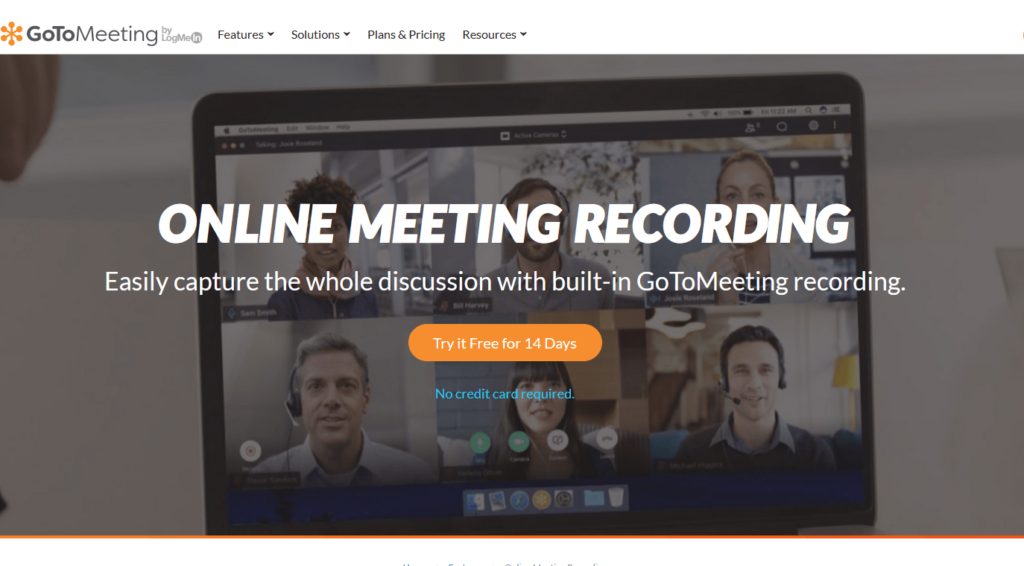A successful meeting depends on a reliable video conferencing platform. Zoom and GoToMeeting both rank near the top of best video conferencing services. But which is better?
Both use communication technology that allows teams to access different features and hold a meeting as close to in-person as possible with so many employees working from home. They come with features like video conferencing, screen sharing, recording, transcribing, and more advanced settings to make conducting meetings easy for your whole team.
The cloud-based software lets you connect with any team, whether you work in education, healthcare, sales, or another field where you need to communicate with others. Choosing the right one means giving your company the tools they need to increase productivity and collaboration.
Can’t decide between Zoom and GoToMeeting? Let’s look at how they stack up against each other.
Zoom Pros and Cons
Pros
- Lot s of advanced options
- Offers Breakout Rooms for meetings
- Easy to navigate
Cons
- Some add-ons are expensive
- Lots of extra costs
- Advanced screen & audio sharing
- Join meetings from any device
- Password-protected meeting security
- Five pricing plans
GoToMeeting Pros and Cons
Pros
- Flexible calling features
- Unlimited storage and recording
Cons
- Some features are very basic
- No free version
- Unlimited meeting storage & sharing
- Automatic participant calling included
- Built-in VoIP audio
- Three pricing plans
Video Conferencing: Zoom
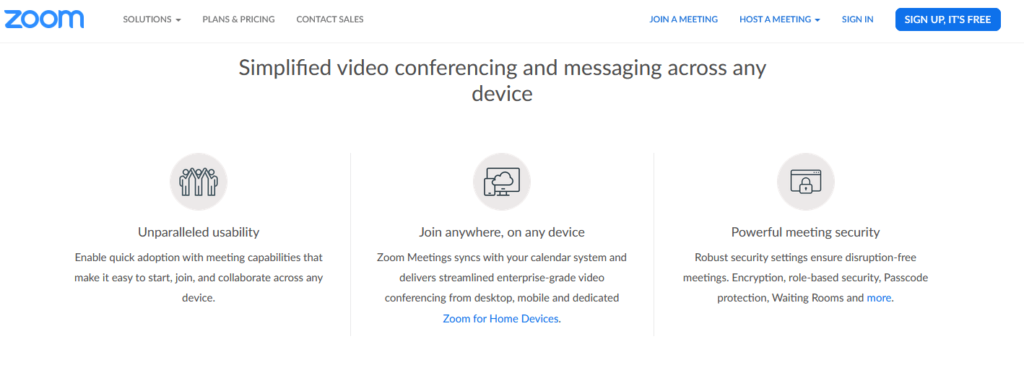
To hold a productive meeting, you need excellent video quality and excellent connectivity. You don’t want your platform to kick you off every time you have more than a few meeting participants, after all.
Zoom and GoToMeeting have some video conferencing features in common, and both give you high-quality HD video. You can switch between different views, like full-screen and gallery, as well as use multiple feeds.
With up to 49 webcams with Zoom and 25 with GoToMeeting, both accommodate most businesses. When it comes to appearing on camera, Zoom goes the extra mile by giving you the “Touch up my appearance” setting that spruces you up if you’re not looking your best for that 9 am meeting.
GoToMeeting doesn’t give you a filter, but it does let you adjust more advanced settings, like brightness, contrast, and saturation. Playing with those settings can offer similar advantages, but it requires you to adjust them manually. Zoom’s filter does it for you automatically.
Zoom and GoToMeeting both offer backgrounds if you haven’t had time to tidy your workspace lately. Zoom also allows you to join your meeting from any device, including iPhone and Android.
Overall, Zoom has more advanced video features. GoToMeeting has enough to get you by, but if you want more flexibility when you hop on your call, Zoom has it.
Screen Sharing: Zoom
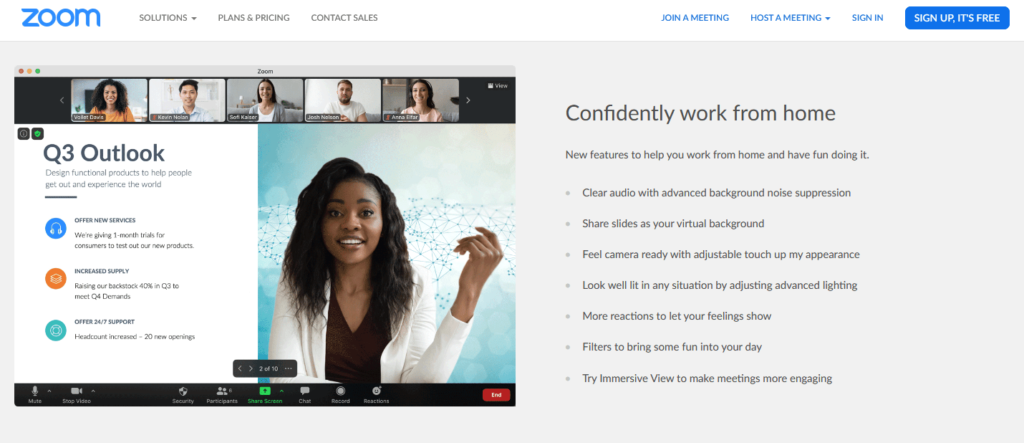
Zoom and GoToMeeting both have user-friendly screen sharing capability that shows which apps and windows you have open on your device, so you can choose what you share. You can also make it so specific people have control of the mouse.
Both platforms have a window that shows all your options for sharing, and with GoToMeeting, you can view them as a more compact list. Zoom and GoToMeeting allow others besides the meeting host to share their screen. You can even share on mobile!
Zoom offers more advanced screen sharing than GoToMeeting. It comes with audio sharing, so you can play a video that everyone can listen to, rather than just GoTo’s visual sharing feature. Zoom also allows you to share only part of your screen.
With Zoom’s simultaneous sharing options, you can share more than one monitor. For example, if you have several people contributing to a discussion, they can all show their screens to other participants. You also have document sharing on iOS and Android.
GoToMeeting gives you the basics of screen sharing, but Zoom shines with more well-rounded features, like its audio. Those features allow for more versatility when it comes to offering information and resources in meetings.
Storage and Recording: GoToMeeting
When you have a meeting, you sometimes want to reference what someone said without writing it all down. Both Zoom and GoToMeeting have recording and transcription features that you can save in various formats, including .mp4, .m4a, and .txt.
Zoom’s free version lets you record and store locally on your device, but you have to upgrade to the paid version to get 1GB of storage with Zoom itself. Some plans also offer automatic cloud recording transcription. If you need more than 1GB of storage on Zoom, you’ll have to pay $40 or more every month.
That’s where GoToMeeting has an advantage. It has unlimited storage starting with its Pro plan, whereas you only get unlimited Zoom storage with the Enterprise package.
GoToMeeting also makes it easier to share your recorded meetings when you can keep more of them on hand. Like Zoom, it also has automatic transcription.
When it comes to storage, recording, and transcription, GoToMeeting wins out. If you record many meetings, GoToMeeting gives you the space to do that at an affordable price. Other than storage, Zoom and GoToMeeting offer most of the same recording and transcription features.
Calling and Audio Options: GoToMeeting
Calling on your video conferencing platform should make things convenient for you. At the same time, you want high-quality audio without paying extra or using clunky devices.
Neither Zoom nor GoToMeeting requires you to use a phone or to dial into a meeting. All you have to do is turn on your computer’s microphone and speakers, and you get excellent audio quality with both platforms.
With Zoom, you can quickly test your computer’s audio to make sure you can hear others, and they can hear you. Both Zoom and GoToMeeting have the Call Me feature with traditional calling that will call meeting participants when it’s time for your meeting, so no one worries about forgetting the time. However, Zoom’s Call Me feature comes as a $100 add-on, while GoToMeeting includes it in every plan.
Overall, GoToMeeting has better calling features. It becomes more flexible when you want to use a phone to join the meeting, too. It has built-in audio using VoIP and Toll, and it makes more advanced features like Call Me available without having to factor them into your budget separately.
Administrative Controls: Zoom
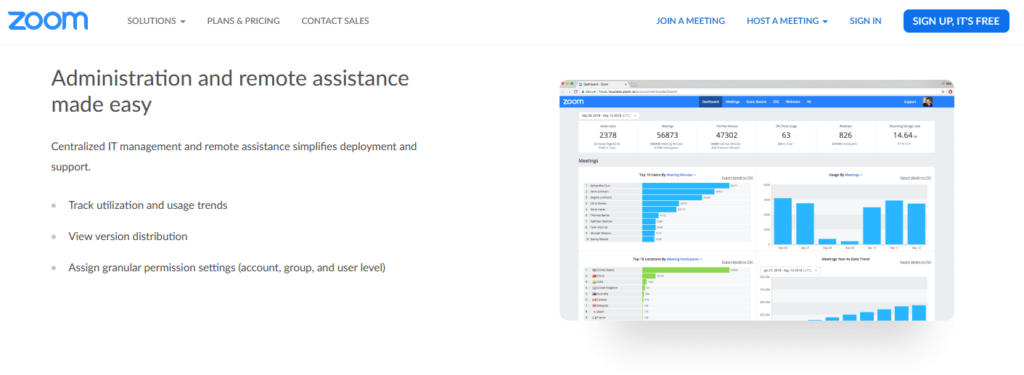
When you run a meeting, you want to have control over it as the host. That includes who you let in, who controls which features, and who has the floor during the meeting.
With Zoom and GoToMeeting, the host has a lot of options when it comes to controls. As the host, you can mute or unmute participants and decide whether meeting members can mute or unmute themselves. You can also control screen sharing options and webcam visibility.
When it comes to chatting, you can adjust the settings so participants can chat with everyone or just the host during meetings. Both platforms have a feature that makes participants wait to get logged in via the Waiting Room (Zoom) or Meeting Lock (GoTo). These features allow for better meeting security so unwelcome participants can’t enter.
Zoom comes with another security feature that GoToMeeting doesn’t have—password protection. If you set the meeting so that participants can join before the host shows up, you can give everyone a password to join early.
Although GoToMeeting and Zoom share many features, including the ability to temporarily remove participants and put them on hold, GoToMeeting doesn’t include some of Zoom’s more advanced features like administrative control over recording, chat, notifications, and encryption, making Zoom a better option if you want to run a meeting your way.
Ease of Use: Tie
When you choose a video conferencing platform, everyone should be able to use it without any trouble. A steeper learning curve can delay meetings and waste time that your team could use planning, collaborating, and increasing productivity. With a user-friendly platform, you can seamlessly jump into your meeting without the wait.
GoToMeeting and Zoom have interfaces that almost anyone can figure out quickly. Zoom is a little more streamlined, with all meeting options laid out on one page with a visually pleasing design. There’s no overcrowding, and you can hover over or click on each one to select between them. You can even choose not to show the control panel.
GoToMeeting always has its controls on a full-page panel in a separate window from the meeting screen. You can shrink them, but you can’t hide them. They also have a more crowded layout, which makes it slightly less intuitive than Zoom.
GoToMeeting has lots of dropdown menus and right-clicking to navigate to additional options. On the other hand, Zoom clearly indicates where you can find your options with arrows attached to different features and settings on the page.
GoToMeeting’s layout is fairly straightforward, but if you want one that requires minimal thought to get around, go with Zoom.
Pricing: Tie
When it comes to pricing, consider how well the features stack up to the cost instead of going for the cheapest product. A cheaper package might mean the product lacks some of the features you need, which can cost you more in the long run.
Zoom has a free plan, which GoToMeeting doesn’t. On the other hand, GoToMeeting has more affordable paid packages than Zoom, and the two offer many of the same features. Each product has its advantages, from storage with GoToMeeting to administrative features with Zoom.
With Zoom, you’ll likely end up paying for some add-ons if you want to make up for what it lacks in storage and attendee limits. However, you may find that its free plan does all you need for your business.
Zoom has five package options:
- Free
- Pro: $149 per year per license
- Business: $199.90 per year per license
- Zoom United Business: $300 per year per license
- Enterprise: $240 per year per license
The Free and Pro plans both allow up to 100 participants, though Pro upgrades to a group meeting limit of 30 hours from the Free plan’s 40 minutes. Business bumps you up to 300 participants and gives you more advanced features like single sign-on, recording, transcripts, and managed domains.
Zoom United Business has many of the same features as Pro. However, it also includes more phone features from Zoom United Pro, like unlimited calls to the United States and Canada, automatic call distribution, and a dial by name directory.
When you get the Enterprise package, you have a higher minimum license requirement, so you’re technically getting a discount. This package allows up to 500 participants, unlimited cloud storage, and a dedicated customer success manager.
GoToMeeting has three packages:
- Professional: $12 per organizer per month
- Business: $16 per organizer per month
- Enterprise: Custom pricing
Professional gives you up to 150 participants with unlimited meetings and no meeting time limits. You also get some advanced features like Call Me, single sign-on, and administrative features.
Business upgrades you to 250 participants and comes with unlimited cloud recording. You also get features like transcription, meeting lock, and mobile cloud recording so you can have the full range of meeting features on the go.
Enterprise gives you the option to customize your package and hold meetings with up to 3,000 people. The main selling points for this tier include the Enterprise customer success manager, onboarding and training, and its volume discount. Otherwise, it has most of the same features as the Business package.
When you base your buying decision on price alone, GoToMeeting wins here. However, the two platforms offer different features in different packages, and GoToMeeting doesn’t have a free version. We can’t say for sure which would be right for your business based on cost, so choose based on your needs for your meetings.
Integrations: Zoom

When you can integrate your video conferencing platform with other workflow management tools, you streamline productivity in the workplace. Zoom and GoToMeeting have many of the same integrations, like Slack, Salesforce, and Office 365. GoToMeeting also has a Google Calendar plugin.
Zoom takes the prize for the most integrations, though. It includes Atlassian, Dropbox, Azure, and Okta, among others. Its integration features are more comprehensive, and it has a bunch of add-ons to boost its performance and functionality.
The only downside is that the add-ons cost money, and some can be $100 or more. Still, the broader selection of integrations means that you can do more with Zoom and have more communication capabilities and options with your team.
While GoToMeeting has a few workflow integrations, Zoom wins out by making itself compatible with almost any business. You won’t have to worry about it not working with your existing system.
Meetings: Zoom
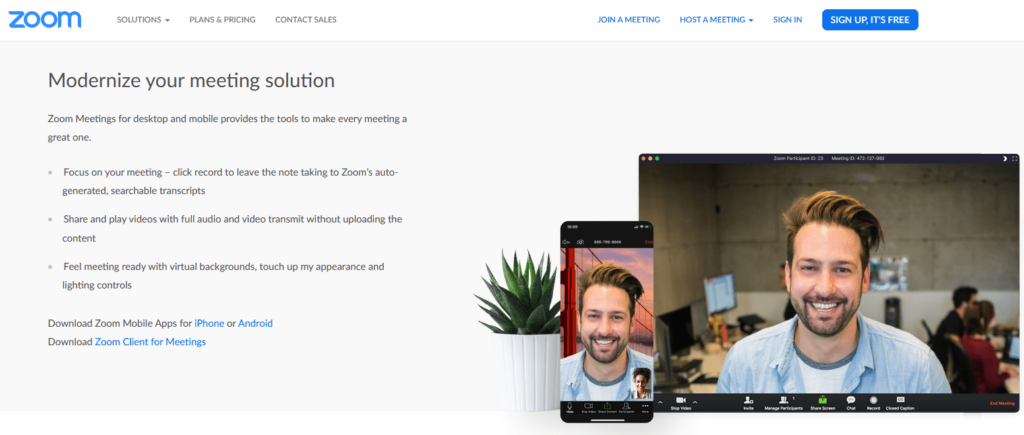
Zoom is a leader in meeting platforms. Its intuitive platform makes it so simple that most teams pick up how to use it right away, whereas GoToMeeting might take a little longer to figure out.
Zoom has more meeting security, whereas GoToMeeting has some, but it’s not quite as in-depth. Both platforms have single sign-on, encrypted meetings, dismiss user features, and meeting locks. However, Zoom also has password-protected meetings for when the host hasn’t yet joined.
Zoom has more features that let you connect with others and even have some fun during your meetings with backgrounds and filters. GoToMeeting has enough basic features to get you through, so if you don’t need anything fancy, its crystal-clear video and audio and more advanced features in lower-cost packages make it worth considering.
Overall, Zoom’s ease of use, additional security, and more advanced features make it a better choice for video conferences.
Chat: Zoom
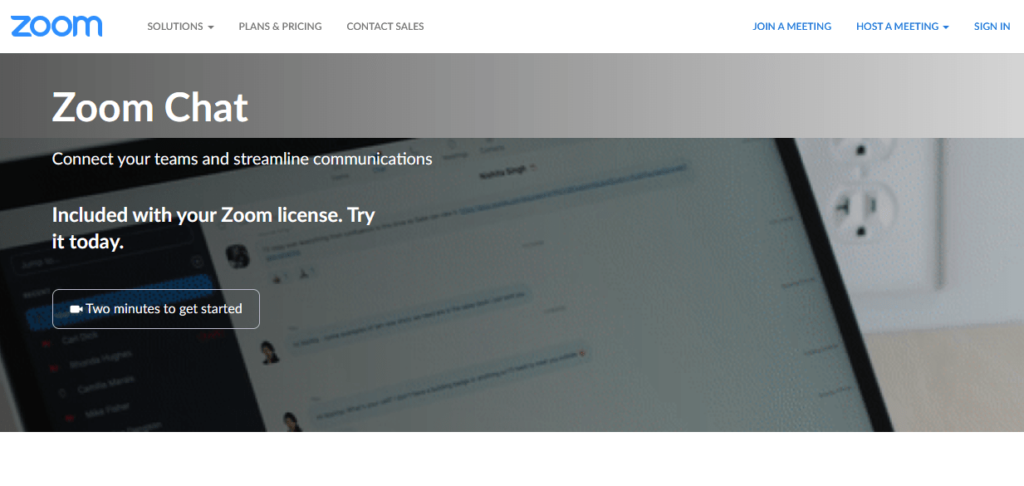
Sometimes, you don’t need to hold a meeting to discuss part of a project. For quick communication without jumping on a call, Zoom and GoToMeeting have chat features you can use on their own or during meetings between participants.
You can communicate between team members or external members, like vendors and customers, on both platforms. Creating separate rooms specific to various groups within teams helps keep everyone organized. You can also switch from chat to video with one click.
By setting statuses, you can see who’s available when you need them. With chat, you can even attach files and search for messages to find information fast.
Once again, Zoom has a little more capability here with starred channels, so you know where your most important chats are at any given time. It also archives your chat data for up to ten years.
Phone System: Zoom
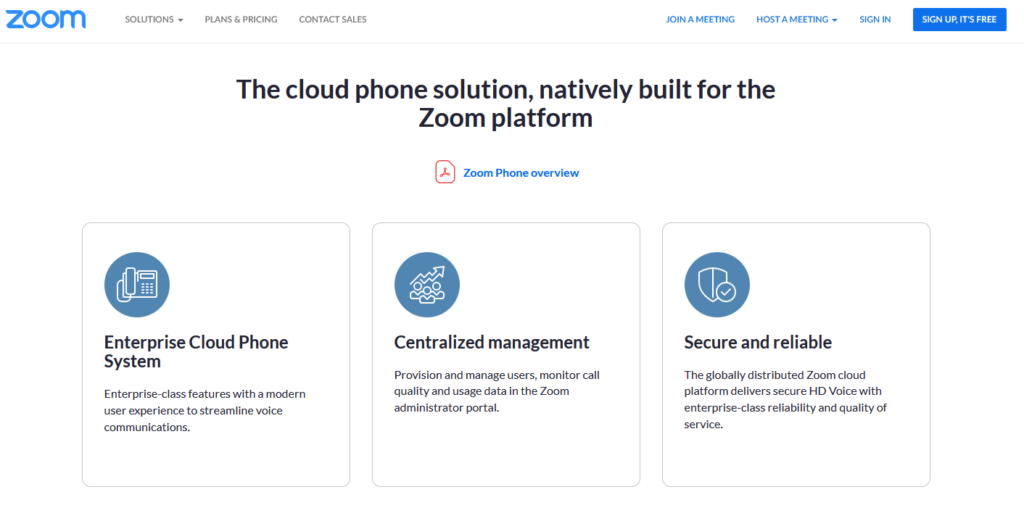
If you want phone service capability, Zoom and GoToMeeting both have a cloud-based phone system. They even have separate plans for phone-specific features. In Zoom’s case, some of those features are included in Zoom United Business.
Both platforms come with video, HD voice, voicemail, and call recording. GoToMeeting has a broader selection of phone plans, but both platforms operate with Windows, Linux, and Mac. As with its video conferencing plans, GoToMeeting has cheaper ones for phone service.
Overall, Zoom has better quality service, especially with mobile. GoToMeeting’s mobile app lags sometimes, and it’s been known to kick people off the call.
Conference Rooms: Tie
Conference rooms let you join a room with one touch. You can share multiple desktops in one room simultaneously, so you don’t have to worry about booking your meeting or sharing screens between multiple people.
GoToMeeting sets up conference room capability in 15 minutes, making it especially convenient. It works for various room sizes, so you can even accommodate large groups. It also lets you sync your room with the GoTo Admin Center.
Zoom lets you join a conference room using your existing conference system, which can make for low-effort connections. It also comes with a one-click wireless share and up to 12 whiteboards per meeting. With role-based administration and extra security, Zoom keeps your meeting secure.
In this case, you may want to consider your priorities. Do you want convenience or comprehensive features? GoToMeeting still lets you collaborate with many people at once, but Zoom allows for more sharing within your group.
Final Verdict
- Advanced screen & audio sharing
- Join meetings from any device
- Password-protected meeting security
- Five pricing plans
Overall, Zoom is the clear winner when comparing the two video conferencing platforms. Both have excellent features, and GoToMeeting has a few advantages over Zoom, like unlimited storage and superior calling options.
When it comes to general features and usability, Zoom pulls ahead with breakout rooms, filters, chat archives, and a more intuitive interface. If you don’t need the frills, GoToMeeting might have what you need, and its plans are cheaper than Zoom.
If you’re looking for a popular, easy-to-use platform, you’ll have more luck with Zoom. It has a lesser learning curve, so you’ll spend less time figuring it out and more time increasing meeting productivity. Some things depend on your business needs, so decide which works for you based on them.



